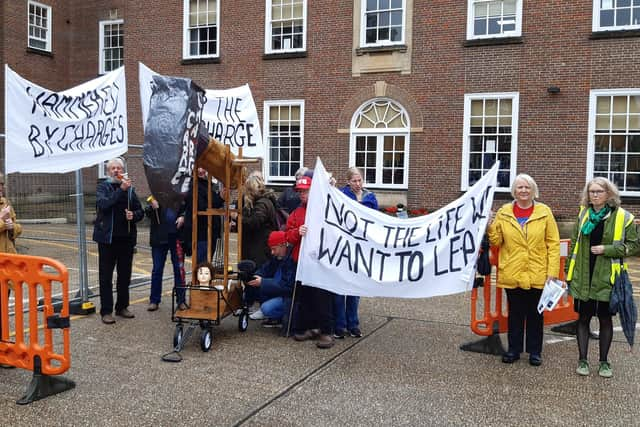Huge dissatisfaction in West Sussex as care charge increases start to bite
and live on Freeview channel 276
There was an outcry in March last year when care charges sky-rocketed and were backdated to January 2021, piling financial worries on to people already coping with some serious challenges.
Since then, the council has put in place a Financial Assessment Improvement Plan in an effort to develop the quality of customer service provided throughout the financial assessment process.
Advertisement
Hide AdAdvertisement
Hide AdBut during a meeting of the Health & Adult Social Care Committee on Friday (September 23), it became apparent that things weren’t working well for many.


The results of a survey, responded to by more than 1,100 people, showed that only 35 per cent were satisfied or very satisfied with the way their financial assessment had been carried out, while 28 per cent were dissatisfied or very dissatisfied.
The rest were either on the fence or did not know.
When it came to contacting the council for help or additional information, the satisfaction/dissatisfaction figures were 37 per cent and 36 per cent respectively.
Problems ranged from not being able to speak to someone or leave a message to getting no response at all or a response that didn’t actually answer the question asked.
Advertisement
Hide AdAdvertisement
Hide Ad

James Walsh (Lib Dem, Littlehampton East) called some of the information received via the survey ‘depressing’ and some of the figures ‘shocking’.
An he accused the council of looking for a ‘financially driven solution’ to the problem of care costs ‘rather than a customer-focussed solution’.
As for the policy of charging people for social care in the first place, he said it was ‘wholly wrong’.
To applause from the public gallery, Dr Walsh added: “It’s a shocking condemnation of a basically rich society that we’re actually taxing the ill in social care when we don’t do that for the National Health Service.
Advertisement
Hide AdAdvertisement
Hide Ad“There ought to be the same system for both the NHS and social care, that it’s free at the point of use.”
The council recorded 391 complaints about care charges/financial assessments between January 1 2021 and September 1 2022.
Of those, 335 have been closed, with seven being treated as appeals while the rest are at various stages in the response process.
With the government’s social care reforms due to come into effect next year, Alan Sinclair, the council’s director of adults and health, predicted a ‘significant change’ when the council would have ‘a further conversation about charging’.
Advertisement
Hide AdAdvertisement
Hide AdLooking at the responses to the survey, Amanda Jupp, cabinet member for adults services, said communication around the financial assessments hadn’t been ‘as good as it should have been’ and the council needed to make sure information was ‘clear and concise’.
She added: “That’s been one of the problems. These financial assessments are so complex and, in many cases, are very individual and I don’t think we fully took that into consideration when we set out to carry them out.”
While Mr Sinclair said there would be a ‘significant improvement’ in how soon people were warned about changes, that won’t alter the fact that those changes are piling more stress onto families who already have more than enough to endure.
One response to the survey described receiving a ‘red reminder’ for an invoice for £4,000, adding: “I cannot pay these extortionate charges as I am a disabled house-bound pensioner.”
Advertisement
Hide AdAdvertisement
Hide AdAnother said: “Due to the ridiculous 240 per cent increase in my contribution to West Sussex, I am now unable to afford most essentials for everyday living.
“The amount of money this is currently taking leaves nothing for me to contribute to my costs [such as] council tax, electricity, water, gas, food.”
The council – like others across the country – has been on a hiding to nothing when it comes to finances, with the government stripping away funding year after year.
But each local authority still has a duty under the Care Act to promote the social and economic wellbeing of residents.
Advertisement
Hide AdAdvertisement
Hide AdThis includes principles such as ensuring that people ‘are not charged more than it is reasonably practicable for them to pay’.
It’s a duty some feel the council has not met.
A handful from the group Warrior Carers braved the rainy weather to march on County Hall to protest the rising charges and make clear the impact they were having on those being told to pay.
Campaigner Chris Nichols called on the council to do better for disabled people.
He added: “We understand the almost impossible position councils have been placed in as a result of the draconian cuts in income they have experienced from central government during the years of austerity, but not all councils have responded to this situation by constructing such a punitive charging regime as West Sussex.
Advertisement
Hide AdAdvertisement
Hide Ad“In Hammersmith and Fulham for example in-home care is free.
“Why should that not happen in West Sussex, one of the most affluent areas in the country?”
The officers’ report discussed by HASC concluded: The findings of the survey showed there was a correlation between the complexity of national charging arrangements and customer satisfaction. Home and community customers who are subject to greater complexity, were the least satisfied with the process for their reassessment, whilst residential customers, with more straightforward arrangements were the most satisfied.
"It is anticipated that the actions which have been added to the improvement plan as a result of the survey will improve the customer journey. In addition, the council will review when and how financial information can be co-designed with customers to further improve the financial assessment journey.”